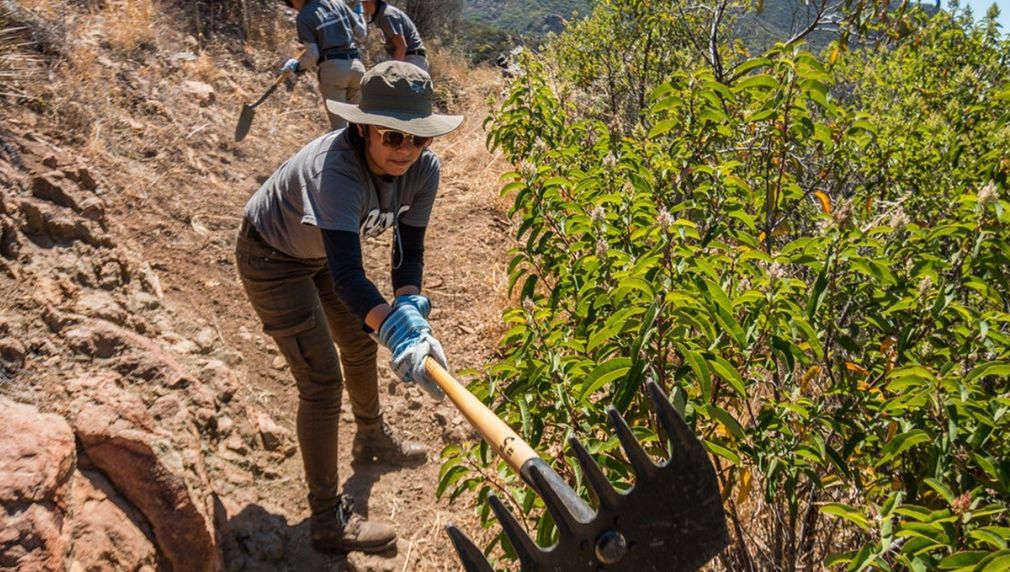Green Careers: Building Belonging in the Climate Workforce
Green Careers: Building Belonging in the Climate Workforce trains underrepresented LA youth for paid field-based jobs in conservation and climate resilience. By restoring public lands and learning high-demand green skills, participants gain access to career pathways that offer economic mobility, financial stability, and purpose. This program bridges the gap between historically excluded communities and the growing green economy while making Los Angeles’s natural spaces healthier and more accessible for everyone.

What is the primary issue area that your application will impact?
Youth economic advancement
In which areas of Los Angeles will you be directly working?
County of Los Angeles (select only if your project has a countywide benefit) City of Los Angeles (select only if your project has a citywide benefit)
In what stage of innovation is this project, program, or initiative?
Expand existing project, program, or initiative (expanding and continuing ongoing, successful work)
What is your understanding of the issue that you are seeking to address?
In Los Angeles, thousands of opportunity youth face steep barriers to accessing jobs in career pathways, including climate-aligned, field-based conservation work. Despite a surge in green jobs, these careers remain largely inaccessible. Many entry-level roles require unpaid experience, insider networks, or degrees that youth from many communities often cannot afford.
Statewide, people of color hold just 16% of jobs in environmental organizations, even though they represent more than 36% of California’s population and are disproportionately affected by the climate crisis. Los Angeles youth face one of the highest unemployment rates in the country. In some parts of the county, youth unemployment exceeds 20 percent. For many young people, the first job sets the tone for their future. When that job is paid, purpose-driven, and connected to long-term careers, it can break cycles of poverty and open doors that would otherwise stay closed.
Describe the project, program, or initiative this grant will support to address the issue.
The Green Careers initiative is a paid training program that prepares underrepresented Los Angeles youth for careers in conservation, land management, and climate resilience. Participants work on public lands alongside professionals from agencies such as the National Park Service and California State Parks. They restore trails, grow native plants, and care for natural spaces while gaining practical skills that lead to high-demand green jobs.
The program serves youth who are often excluded from workforce opportunities because of financial, geographic, and systemic barriers. To remove these barriers, Green Careers offers full wraparound support. Every participant receives daily meals, transportation, and essential equipment such as boots, gloves, hats, and water bottles. These supports ensure that no young person is held back by what they cannot afford.
Participants also benefit from mentorship, job-readiness workshops, and exposure to long-term career pathways in public agencies and environmental organizations. For many, this is their first paid job and their first experience seeing themselves as part of the climate workforce.
By combining hands-on training with real support and career access, Green Careers helps youth take their first step into meaningful employment. At the same time, it strengthens Los Angeles’s ability to respond to climate challenges with a skilled and diverse local workforce.
Describe how Los Angeles County will be different if your work is successful.
If Green Careers succeeds, Los Angeles County will have a more inclusive and climate-ready future. Underserved youth will be shaping the very systems that once excluded them. Public agencies and environmental organizations will no longer struggle to find diverse, trained candidates. They will have a local workforce ready to lead, drawn from the communities most impacted by climate change.
Our parks and public lands will be healthier, more accessible, and more reflective of the people who live here. Youth who once felt disconnected from nature will become its stewards. Trails will be safer. Habitats will be stronger. Green spaces will be maintained by those who see them as part of their own future.
In five years, hundreds of alumni will be working in public agencies, nonprofits, and environmental careers across the region. In ten years, alumni will be mentoring the next generation, holding leadership roles, and helping reshape what equity in the climate workforce truly looks like.
Approximately how many people will be impacted by this project, program, or initiative?
Direct Impact: 100
Indirect Impact: 500